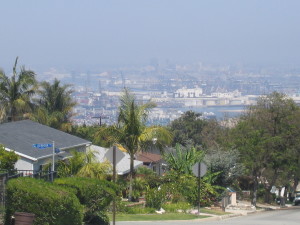The Southern California Gas Company announced today that they’ve controlled the gas leak at their Aliso Canyon facility. They will now work on permanently shutting down the well that caused the relocation of thousands of Porter Ranch residents. While the problem hasn’t been solved completely, it is a big step forward.
Now’s the time to take a look at other communities in our region and the long struggles they’ve had trying to address pollution problems. If these communities got as much attention as Porter Ranch, their problems might have been solved decades ago.
Del Amo: Cynthia Babich used to live in the unincorporated Los Angeles County area known as Del Amo, which is located in the Gateway area next to Carson, Torrance, and Gardena. Her community hosts two Superfund Sites. She’s been fighting to protect the residents of Del Amo for nearly 20 years. One day, she succeeded in getting a local television news station to do a story on the Del Amo Superfund sites. A camera operator and news reporter showed up and interviewed her. After a few minutes, one of them said to the other, “Let’s get out of here.” The reply was, “Okay, in a minute.” Then, the first guy said, “Aren’t you getting hazard pay? I’m getting hazard pay.” They quickly packed up and left. Another time, a reporter was interviewing Cynthia and a butterfly came into their view. It flapped around awhile and then dropped out of the air, hit the ground, twitch a little bit, and died. Cynthia just looked at the reporter. There wasn’t much more to say. The U.S. Environmental Protection Agency has proposed leaving community members living above highly contaminated soils and groundwater for the next 300 years while they clean up the mess.
Magic Johnson Park: Shabaka Heru and his neighbors in South Central Los Angeles once looked at Magic Johnson Park as an incredible community victory. In a rare occasion, the County of Los Angeles “downzoned” the area where the Athens Tank Farm once operated. The County built a beautiful park with a lake where residents could fish and, in the 1970s, a private developer constructed a low-income residential community housing project called Ujima Village. The only problem was that they didn’t bother to clean up the pollution before building the park and allowing residents to move in. They even had a daycare center on top of the contamination. The residents and day care center are gone but the contamination remains. Ujima Village has become a community eyesore and a viable plan to clean up the pollution has yet to be put in place. Shabaka has spent many years trying to right this wrong. He continues to attend meeting after meeting urging elected officials and policy-makers to clean up his community.
The Port of Los Angeles: Jesse Marquez never thought much about the air pollution impacts from the Port of Los Angeles until about 15 years ago when the Port proposed to build a six lane diesel truck freeway through his Wilmington community. He then discovered the dangers of breathing the exhaust from ships, port terminal equipment, and the diesel trucks that drove through his neighborhood every day. He got involved. He helped the plaintiffs fight to get “mitigation” measure commitments when the Port proposed to expand the China Shipping terminal. He worked on securing additional environmental mitigation measures when the Port proposed to expand the TraPac terminal. He recently found out that the Port never fulfilled all the promises they made to reduce air pollution in his community. Meanwhile, the Port of Los Angeles and Port of Long Beach are preparing for a tripling in the number of shipping containers coming through the ports within the next 25 or so years. Jesse would like the Port of Los Angeles to make good on its pledge and commit to ridding his community of the air pollution and quality of life problems that come with hosting the largest port complex in the United States.
Conclusion. These are all environmental justice communities, places where low-income residents and people of color live. It’s time for Cynthia, Shabaka, and Jesse, and all of the others, to get the same kind of attention we gave to Porter Ranch. It’s time for their suffering to stop. It’s time for their pollution problems to go away. Now.
[share title=”Share This Post”]









Does the coalition have any opinion on the dismissal of James Lester at the Coastal Commision?
Thank You very much!